Graham Reid | | 22 min read
Howe Gelb and A Band of Gypsies: Cowboy Boots on Cobble Stone (from the album Alegrias)
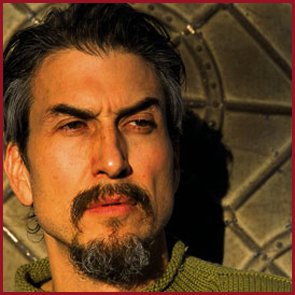
Howe Gelb of Tucson, Arizona is one of the long distance runners. He's been in for the long haul with his band Giant Sand (two dozen albums since the mid Eighties) and diverse solo projects under his own name (around 18 which range from gospel in Canada to flamenco desert-rock in Cordoba, Spain on his new release Alegrias).
And there are other albums as OP8, the Band of
Blacky Ranchette, Arizona Amp and Alternator and more recently Melted
Wires with an internet only self-titled release (available here).
Gelb's music ranges from dusty desert
folk-blues with a twang of country to stride piano jazz.
He's a hard man to pigeon-hole –
which explains why Giant Sand have existed on the periphery of many
people's consciousness. It's their loss. He is something special and last year's Blurry Blue Mountain (a Best of Elsewhere 2010 album) is the ideal introduction.
As he acknowledges, he fell between
the counterculture of the early Seventies and the punk rock
revolution of the end of that decade. His music career was therefore
defined by Bob Dylan and Neil Young at one end and the DIY of the punk
ethic at the other.
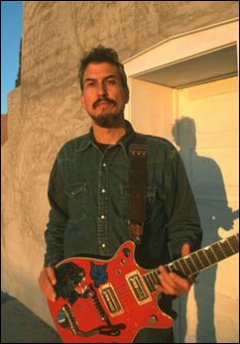
Giant Sand – which began life in '93
– have remained an acclaimed cult act for decades now: their
membership changing in the early years with Gelb as the sole
constant. But two of its members – Joey Burns and John Convertino –
began to run a parallel band Calexico which went on to greater
success.
In this candid and lengthy interview
Howe Gelb – witty, self-effacing and honest – addresses some of
those matters, speaks about his new album recorded in Cordoba with a
group billed as A Band of Gypsies (which has been nominated as the best
“fusion” album in Spain, a description which amuses him because
its meaning is lost in translation), his extraordinary internet only
album Melted Wires (with drummer Convertino, available here) and how he has managed
to keep Giant Sand and an exceptionally prolific solo career going
for so long.
He talks about obsessive German
collectors, the joy of being in Cordoba, and of how there was a
difference between “millionaires and thousandaires” in the music
game. U2 Vs Giant Sand in other words.
“But this is the benefit of not being
too popular. I don't have to wait two to four years for every new
release. Instead of making one record that sells 500,000 copies I can
make 40 records that will sell a total of 500,000 and I don't mind
doing that.”
However his career choices came at a
price he notes, but he's still here -- and we spoke as a massive
Giant Sand and Howe Gelb reissue programme was launched, around 30 albums in total.
Before we got down to business we spoke
of newsrooms staffed by young journalists with little background
experience (not like Walter Cronkite whom you could trust), he spoke
warmly of Auckland musician Chris Knox who had a stroke two years ago
and whom he knew from playing in New Zealand, sent his condolences
for the city of Christchurch where he had played, and how his last
solo tour in New Zealand five years ago faltered because of poor
promotion by a local enthusiast.
Which is where we pick up the
conversation . . .
I am guessing that early on certain
people all over the world would hook into your music and get it. Did
you initially do a lot of touring on the back of fans inviting you to
play.
Yeah, we did it both ways because I
came from a point of sonic existence between punk rock of the late
Seventies and the counter-culture of the early Seventies, like 69-72,
when I started listening to music. So in that space when we started
making music, that was the ethic we carried with us. And when punk
rock came around that made the most sense, even though my godfathers
were Bob Dylan and Neil Young and that ilk of wordy songwriter with
cool guitar leads.
Punk rock freed everybody up and you didn't have to know how to play so much because it was all about attitude. It also meant you needed to do it yourself and not rely on anybody else and that ideology has sustained me from the very beginning. When I finally figured out how to make records in the mid Eighties I only licensed them, I never sold the rights to anybody. Which meant I always keep ownership of them and they would return back to me at some point.
I didn't even know why that was important
but I just felt it was better that I had them than someone else had
them who didn't care later on.
The downside of that is that if a
company has more of an investment in your records then they will work
harder to get a return on that investment as income. So that left us
at a certain level of notoriety and allowed us to stay alive as long
as we have, 25 years or so, but also kept our level of availability
or prominence to a less than household-name level.
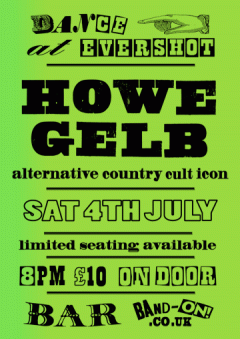 Then there has been all these ways of
touring. Sometimes we would use touring just to go a certain place,
just as a vehicle. Like, if I wanted to go to New Mexico for the
weekend I would set up a show accordingly.
Then there has been all these ways of
touring. Sometimes we would use touring just to go a certain place,
just as a vehicle. Like, if I wanted to go to New Mexico for the
weekend I would set up a show accordingly.
And now we do that with the family. If
we want to go to Greece we'll set up a show there. So we do it in a
way which means we haven't applied it as a form of show business . .
. and sometimes it's not even entertainment but it is something else.
Every time I go out these days,
especially in the last few years, I wonder who my audience is.
I think it's mostly younger musicians
who have found their way there, and there is some kind of embedded
code in the albums which makes a lot of sense to someone starting out
making their own music.
Then there's also my voice which has
gotten more of a baritone and has more of a comfort zone instead of
something on the edge, and that seems to have lured in more young
women. I think that is maybe because of the voice.
We have a wide range of people coming
in, there's my age or older who got into us when they were young and
they're approaching 60 because I'm 54. Or you have the younger musicians
starting out and these young women bringing their boyfriends. I can't
make much sense of it.
I saw Leonard Cohen recently and aside
from women in their 60s for whom he was still a sex symbol there was
an enormous number of young women. I could only think there was
something in his voice which attracted them, they didn't look the
kind of people who would be studying modern American poetics at
university.
I don't think it has to do with the
father figure either, it's sort of where the maturing male is headed
to with that resounding texture of a voice that it falls into at some
point later, and because it is slower than ever it is also more
approachable. It doesn't chase after you, it sets up the perimeter
and within that there is space and time enough to reflect. It offers
some kind of . . . deployment of enjoyment.
Maybe it's that Walker Cronkite thing
we were talking about. “Here's a man I can trust”.
(Laughs) That's it. You summed it up
right there and I took like 12 minutes to get to that.
Let's go back to that ethos you were
talking about when you started out. Is that why you denied the notion
of the band? There's always that band/gang thing which explains why
U2 are together after all these years, they are the last gang. But
that hasn't been the case with Giant Sand with its revolving door
membership.
No, but that was the intention. The way
life was playing I wasn't able to do it as such, but that would have
have been the best way to do it, like the letter bands . . . REM, U2
. . . It's why we formed OP8 and thought that was going to go the way
of the other letter/number bands.
But there was a series of incidents
that determined otherwise and if I had my druthers I still think that
is the best way to do it.
But when you look at Bob Dylan and Neil
Young . . . Dylan had a revealing line in his Chronicles when he said
every time he would put a band together – in Minnesota or New York
– someone else would come along and steal his band,. Someone with
more stage presence or a better voice would like his band and didn't
care for what he was doing, so they took his band away.
So it's not that hard to do because a
player, especially that young, wants to go with the best ticket,
especially if they are not writing their own material and they have
to rely on enough gigs to get by. So they want to go with the best
ticket and I think that scarred him because in all the years that
followed he kept changing members in his band.
The same with Neil Young, although for
different reasons. Because I think he was so fired up and moving so
quickly that it might have been because he knew at any moment it
could be over and no one could keep up with him, especially after
Buffalo Springfield.
Those two guys seemed like having a
whole band could not apply to them, although they both look a little
sad for it too. It is just so much more protective to be in a posse.
But I just listened to the last REM
album and two thirds of it sound like every other REM album I've ever
heard. That's the constraints of a band. One of the things about
Giant Sand I've always thought is that it is a moveable . . .beast.
I was going to say "feast" but "beast" sound better, that whoever comes
in brings something different for you, or you offer them an
opportunity. And for me as a listener that just seems more
interesting.
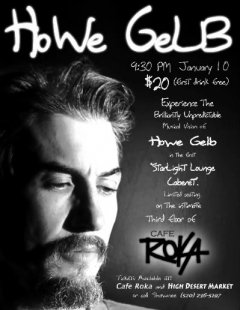 Yeah, but there's a difference between
millionaires and thousandaires. If you offer something that is easily
explainable and can be noted what kind of music it is and what you
are going to get, then you can establish a growing audience that
won't feel jerked around by surprises.
Yeah, but there's a difference between
millionaires and thousandaires. If you offer something that is easily
explainable and can be noted what kind of music it is and what you
are going to get, then you can establish a growing audience that
won't feel jerked around by surprises.
I'm one who likes surprises.
That's the thing. You can get a job in
this life . . . and here's the wisdom of an elder . . . you can pick
a vocation that you are passionate about or you pick one that will
allow you to have a hobby you are passionate about, so you don't ever
have to tax that hobby with the pressures of stress and making a
living. But that hobby could be your vocation, but when you embrace
it, it enslaves you because there are times you have to do things,
like relentless workloads. Which way is better?
I don't think either is better, it is
just a choice you make. The same thing goes for, if you want to talk
about music, are you going to make music you can be more strategic
with to get to a certain place and get what you want out of it,
either materially or to some higher echelon? Or are you going to make
music you are more comfortable with and you prefer to buy and listen
to?
In my case it was the latter and I thought that would also allow longevity. It did allow that, but only to a smaller audience. The only thing about its lack of appeal now is when you have children. Making music without children attached is really easy, you don't realise how easy until you have children. Then making a life in music means you have to cut your time completely in half, at least. And when that happened with me I had to chose what territory I would spend most of my touring time in.
I chose Europe
because it was so much more conducive on so many levels. But now I'm
sorry I didn't work the States more because I don't like to travel so
much. I love being anywhere in the world, but I hate getting there.
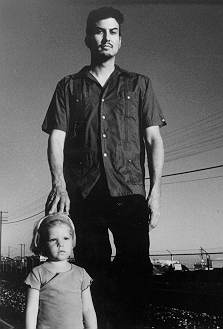 You used to spend a good deal of time
in Denmark because of the family. Do you still do that?
You used to spend a good deal of time
in Denmark because of the family. Do you still do that?
Well, that's because the kids have three months off school, so that allowed us to go there where my wife and her people are from and spend three months there. And it made sense because I could play some shows and it would pay for the whole summer. Most Americans can't afford to spend that much time in Scandinavia because it's so expensive.
There's also a weird cultural
thing where they rent houses there, it's part of the constitution,
who has a family has a small one or two room garden house, what they
call a colony house. Therefore there are loads of these apartments
you can rent or sublet during the summer. All those things made it
possible.
Plus it was the whole time Bush was in
office so it was good to get the kids out of The States so they could
pick up a global attitude, and a second language.
Let's talk about a second language. I
understand you don't speak much Spanish at all.
No. I barely speak music. It occurred
to me when I was in Denmark when people asked me why I didn't learn
the language – and you can't help but learn some of it, I've
learned about 10 different menu languages – but there is a perverse
pleasure being in a crowded area in Denmark for example and only
enjoying the murmur, the cello-like tones of the human voice without
the meticulous exhausting details and the complexity of their lives.
That means they could be talking about me? That seems a fair
trade-off.
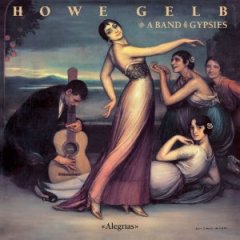 The reason I ask about Spanish is
because I want to talk about the Alegrias album. You just communicate
purely through music with someone like [guitarist] Raimundo Amador
because he doesn't speak much English, does he?
The reason I ask about Spanish is
because I want to talk about the Alegrias album. You just communicate
purely through music with someone like [guitarist] Raimundo Amador
because he doesn't speak much English, does he?
No. It's usually though music and
laughter. These are positive and joyous elements. It's pretty cool
when you don't get to know the details of somebody's life which
absorb so much of our contact with that person. If it's only music --
and I don't know how but we sometimes know what each other is talking
about when we crack up laughing – it's a pretty fine way of
naturally editing the dialogue.
So all the detritus of life disappears.
I imagine it is quicker too.
I love my friends and I go the studio
here in town and the guy who runs the studio is my age and we will
talk for an hour and a half before we get anything done. As you get
older you have a habit of enjoying each other more, because when your
friends get sick or die off you savour any time left with anyone you
know. (laughs)
When you make friends all over the
world it's kinda cool not being able to talk so much and you just get
down to work.
It's a beautiful album. Congratulations
on nominated for the best fusion album in Spain.
(Laughs) But if you translate an album with
“fusion” right? It is “con-fusion” because the Spanish word
for “with” is “con” and “fusion” is “fusion” . . . so
it was “con-fusion”.
When it came to choosing material for
the album, had you sent the Band of Gypsies tapes of the songs?
No, it was just as organic as getting together any other group of people. When I describe it, it will seem more more romantic . . . and in a sense it is. But it was also very natural, just the order of business in that culture and that place.
In Cordoba, a friend of mine Fernando Vacas kept inviting me to his
home, and like many people who extend invitations and there is no
time especially if you have the family back at home in Tucson.
Because you can only be out on the road so long.
As it turned out one time we had two
days and when I was there the town, bizarrely, it felt more home than
home. It felt more like Tucson than Tucson and his house was very
like the one I live in here, these old adobe house with thick walls
and there are no right angles. And like the adobes here they have a
courtyard, and there they are built for the heat. The weather is
exactly the same as Tucson but it is more sensible there because the
roads are narrower to shadow you from the sun.
The food was simple and good, and his
recording studio was in a converted shack on the roof, like a pigeon
coup, two tiny rooms and one he converted into a studio and the other
he put up an engineering board.
And we would gather on the rooftop and
the evening air was so much like Tucson and the heat. And one by one
these gypsies would show up, his friends and people he knew, and
that's what enticed me to begin with.
I couldn't imagine it, but loving
guitar as much as I do I was intrigued by someone who could play that
well, and to find out if we could even meet on the same page. So we
did get together and they started showing up and we were circling
each other. We were all being a little protective and standoffish, and when
they played they blew my mind. They use all their fingers!
And they play like their people
invented guitar . . . and of course they did, they stopped the
evolution of the guitar as it came up from Africa, and that is the
guitar we play today.
So all I could do to impress them was
to play some stride piano, which for some reason I have been playing
for the past five years or so. Those guys could play any instrument
but none of them could play that style of piano. So it was like I
gave them something they could find fascinating, the way I was
finding their playing fascinating. And it was just enough, like an
unwritten right to allow to us to now feel more comfortable with each
other.
I didn't really play piano on the record, I played guitar and when I played they would crack up over my weird notes which they found entertaining. I was stunned and fascinated by their whole different way of playing. The more I hung around them the more I learned. Like how they would clap to their babies those crazy flamenco beats which I still can't understand, and the babies would light up when they clapped to them. And when they were four or five [the children] would hang out in the small clubs until 4 in the morning while their dads would play music.
The whole
culture made more and more sense when I was there absorbing it and I
found myself going there more and more whenever I could.
Making a record was an excuse to be in that town.
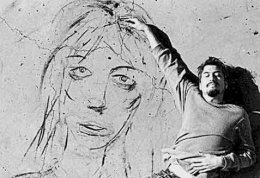 And it is predominantly your material
and you were presenting your songs to them?
And it is predominantly your material
and you were presenting your songs to them?
I was staying at Fernando's house and I
started writing more and more songs. It was the same thing when I
went to Canada to do the gospel choir record, so I used the same
template where I would look at my catalogue and think, The Uneven
Light of Day has some chords that are flamenco-like . . . just like I
did with the gospel choir where Roots Are Bible Black had a gospel
element . . . and I applied that accordingly.
Back when I made all those records I
was making them very fast and didn't start making records until I was
28, which I thought was late in the day. I should have started when I
was 24, but in Tucson it was difficult figuring out how to do that in
1980, so it took until '83 or '84 to figure out where to record, how
to record fast and do it in a day and spend $400 then license the
thing for $1000.
That was that template. Then that would
grow and they would give me $2000 and I would make the record for
half that or $1500, and I would do it in a day or two. That's how it
started, but by doing those records so fast the material seemed
relatively easy to come up with. My songs aren't that sophisticated
and there's not a high degree of harmony or stylistic melody played,.
They are somewhat . . . easy. And I would do a lot to keep the band
working and to keep records happening so we could keep touring.
So you have me as a performer and me as
a songwriter, two different people. And as a songwriter I knew many
of those songs weren't executed the best they could be, but it wasn't
until the late Nineties that I tried to focus in on that.
So when it came time to do the gospel
record I could look back on the vast catalogue as if it was a song
bank and then make withdrawals from the bank. Like, “Here are some
tracks that could have been played better but never were, and now I
can play them as if they are someone else's song and treat them with
respect by doing a cover of them”.
And that's what I did with the Spanish
record as well, but also writing a whole bunch of songs. I know that
when I'm in a good place the inspiration is to get in like that when
everything is happening as it should happen.
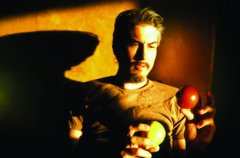 That degree of productivity has a downside though? I remember
mentioning to someone very enthusiastically that there was a new
Giant Sand album out and they said they might just miss this one,
they're like the bus. If I miss it there's another along soon.
That degree of productivity has a downside though? I remember
mentioning to someone very enthusiastically that there was a new
Giant Sand album out and they said they might just miss this one,
they're like the bus. If I miss it there's another along soon.
Yeah [Laughs] And that's exactly the way I feel, the way most humans feel. You are either going to be engaged by the Giant Sand collection – and some of these Germans are just imprisoned by it, they started making live tapes of every show in the late Eighties and now they feel they can't stop. [Laughs]
If they stop it discounts all that
energy and time they put in. So now they have to continue on, as much
as I punish them for every new release and every new tour, because
they have to get out there and capture it.
If you haven't made it easy for people
to digest your music, what you have is baggage, luggage and
exhaustion. When I hear of the Fall I'm glad they are still going,
but I don't feel compelled to go out and listen to another Fall
record.
I know that's the same with Giant Sand,
but I at least want to carry it on until the 25th year.
And now I love the band so much, these Danish guys I've had the last
nine years, it is just fun to do and a really good wall of sound to
be a brick in.
So it still has its relevance, but I
also am free to do these so-called solo records.
It seems just about every Giant Sand
album and album under your own name is coming out on reissue, so for
my friend who says he might just let the bus go past . . .
Well, he could enjoy the ride . .
I said get on now, the next one might
be in an accident . . .
(Laughs) Right . . .
But for him, are there some albums
you'd like to say, “If you hear nothing else by Giant Sand, or one
under your own name, then you do need to hear this one”?
Out of the entire release campaign –
I think there are about 30 coming out, not quite the full catalogue,
all of the Giant Sand plus some solo records – the one that is out
now, because they release them three at a time, Center of the
Universe [released in '92] would be a good one to drop into because that had some
really cool energy to it and great songs.
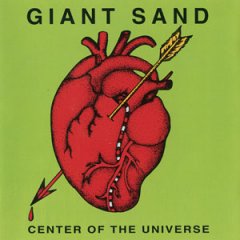 It was the only time I was allowed to
live how I always wanted to live, which was completely alone in a
small one-room cabin out in the desert. Shortly after that, within
three years, I had to move back to Tucson to put my first child into
school.
It was the only time I was allowed to
live how I always wanted to live, which was completely alone in a
small one-room cabin out in the desert. Shortly after that, within
three years, I had to move back to Tucson to put my first child into
school.
I was newly separated at the time so
moved to the desert in the Joshua Tree area to a cabin in the middle
of nowhere right past where the dirt road ended. So I had no TV and
the only entertainment I had was coming up with songs for myself. And
they seemed to come fast and furious and we recorded them the same
way.
They are really a lot of fun and that
record has a real good spirit. I can hear my focus because I was left
alone. I'm the kind of guy who needs two days to have one clean
thought, one uninterrupted focused thought. And with kids and family
and being in the city, that will never happen again.
So Center of the Universe. Go chomp on
that one! See if you can survive that.
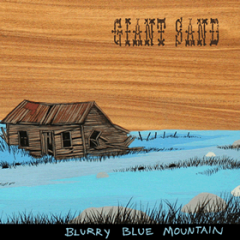 It struck me that Blurry Blue Mountain
was almost the perfect intro to this reissue. Was it deliberate to
put these coherent but slightly different genres out there into the
world at this time?
It struck me that Blurry Blue Mountain
was almost the perfect intro to this reissue. Was it deliberate to
put these coherent but slightly different genres out there into the
world at this time?
If anything my methodology have always been organic, meaning that there's no formula except for trying to do things different every time. There always seems to be at least 1000 different ways to play a song, what if you attacked the lyrics this way? So it never made good sense to me to pick one way and stick to it even though that would have been the most marketable way.
That's not what I prefer. Life is like that, so full of variety, and life, through the miracle of erosion it changes the nature of the land daily and so should things be changed. That said this old planet was spinning faster years ago which is probably why in the Bible those guys lived to be hundreds of years old because the days were quicker.
But that is the natural state of this planet and as far as my records
go I think they are slowing down and don't seem such a blur at the
first 10 or 15. You can look at Blurry Blue Mountain and its clearer
than ever, regardless of its title.
You think, “Oh, this song is like
that and that song is like that, and they pretty much represent all
the genres we have done and seem to be able to do without much
trouble”.
However the thing about it, if you go
on the website it explains how the record got recorded when we are
all in the state of being half awake and it happened three times in
three different sessions and it really bothered me because we weren't
sounding as vital as we should. But then I thought, “This is cool,
I've never made a record like this.”
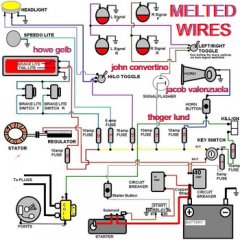 And because of that it has a coherence
to it. I'm going to ask you about one I didn't even know existed,
Melted Wires. You are one helluva jazz pianist, the piece Cordoba in
Winter is an amazing piece of music. You play a lot of piano these
days?
And because of that it has a coherence
to it. I'm going to ask you about one I didn't even know existed,
Melted Wires. You are one helluva jazz pianist, the piece Cordoba in
Winter is an amazing piece of music. You play a lot of piano these
days?
Yeah but I don't have a normal piano in
the house, that should have been rectified. I've got this one from
1888 before they had concert pitch. It is stepped down so C is
actually in B flat, so these things happen. (Plays some stride piano
down the phone.)
When I hear that I hear a Thelonious
Monk from 1930, there's something in the sound of the old piano but
also angular and Monk-like with a stride era feel.
That's where it came from when stride
yanked itself away from ragtime and had more improvisation and
rhythm. I don't know how or why I started playing like that. I really
enjoy it.
Melted Wires is attributed to Melted
Wires? It was recorded around the same time as Alegrias?
It was a year ago last September, there
was me and . . . you know there is a whole other hour of conversation
about the thing between Giant Sand and Calexico. But I have an
appointment at 1 o'clock!
I think I know a little about that
because I spoke with Joey once, but I was curious about the album.
You just managed to find the time . . .
(Laughs) I'm sure whatever you heard
from Joey was a plastic version of what actually happened. He figured
out a way of being in this band for a while, but to not use the more
gambling bits which have also been associated with Giant Sand, and to
clip off the stuff which lent to too much happenstance and keep it
more consistent.
Which is why [Calexico] have become
more popular. Which is what we were saying before: every Calexico
record will be like an REM record, it will be the same thing they are
doing every time for the benefit of their listener and themselves.
Because that is what they've got to do and when they veer away from
that as they tried to do with Garden Ruin [2006] they caught hell for
it. But they are happy because they can play with other people, but
when they do Calexico it has to be that certain suggested sound.
Joey has a tendency to be less
revealing about how he feels about things and more sensible on how
things should look. I tend to be more erratic and evocative and more
reckless with my feelings, I think feelings are reckless and I try to
reflect that. That's also the difference being 10 years older than
him too of course. He didn't come from the counter culture or the
punk idiom, he came from a whole different place and plays the way he
came from nicely.
That said the whole thing with Melted
Wires . . . When the bands began to split up the crowd was very
pulled because there were so many collisions because of the different
agendas and weird things none of us would have imagined. Like who
Giant Sand was. You had the younger people who only knew us when John
and Joey were in the band, but if you were a little bit older you
knew the band before Joey was in it. And of you were even older you
remember when John wasn't in it.
 So what the band could do was being
taken hostage by Calexico's rise because it had two thirds of the
most current line-up of Giant Sand. I had to begin forming another
band because they were no longer available . . . and that didn't
happen directly, I went solo and then eventually realised I had a
band when I went out solo, but they were all Danish. And one night I
realised the stuff we were making was the same as we were making in
any form of Giant Sand.
So what the band could do was being
taken hostage by Calexico's rise because it had two thirds of the
most current line-up of Giant Sand. I had to begin forming another
band because they were no longer available . . . and that didn't
happen directly, I went solo and then eventually realised I had a
band when I went out solo, but they were all Danish. And one night I
realised the stuff we were making was the same as we were making in
any form of Giant Sand.
Then there were people always lamenting
we weren't playing together or thinking “Oh it's not the original
line-up”. But neither was that with them the original line-up etc
etc etc.
The bottom line was, I could not play with John without causing more problems to the people that didn't know what was happening and wouldn't allow Peter [Dombernowsky], to be the new John, or John to be the last Tom Larkins or whatever.
Somewhere in there
when I did the solo record with the gospel choir I had the drummer of
Arcade Fire right before he was in Arcade Fire, so it is tricky for
public perceptions.
People think they want one person over
another so therefore John and my ability to play together is now
severely limited. Melted Wires happened organically because my bass
player from Giant Sand now lives in town, but not the drummer, so to
get together we found ourselves taking on a benefit show and doing
rehearsals in the studio and I recorded them and after the fact I
realised there was a record in there, possibly.
And if you are familiar with W. Eugene
Smith then that was that template, because he wired up his loft and
recorded all those great beboppers including Monk. So that's all it
was, finding an excuse for us to play together which wouldn't be
harmful, or suggesting it was Giant Sand again.
Or the next bus?
Yeah (laughs) We're not sure where this bus going, but you can get on if you like.
The Howe Gelb/Giant Sand etc website is here.

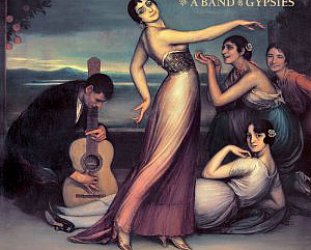
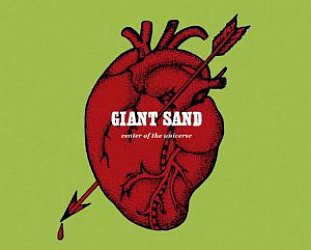
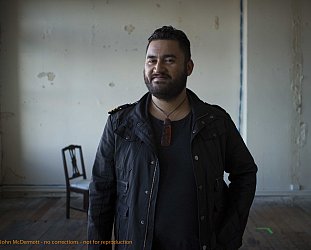
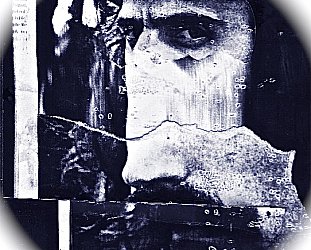
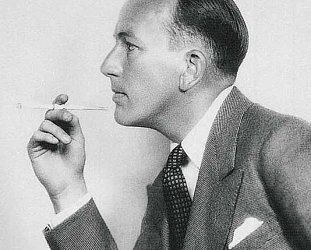
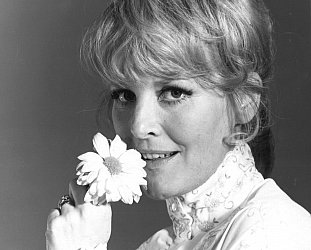
Garth Cartwright - Jun 8, 2011
Great interview! You got so much more out of Howe than I did when I turned up in Tucson to intv him for More Miles Than Money. I guess he has a new album and the reissues to promote so was willing to give you the time while I caught him when he had no product to promote so he turned into the most difficult interview in the entire book! He's in London real soon performing the flamenco album but I'm not as enthusiastic about it as you so may pass on going. Listening to Lee & Nancy right now - Lee remains Arizona's greatest ever musical son. His eccentric solo albums surely impressed a young Howe.
Savepost a comment